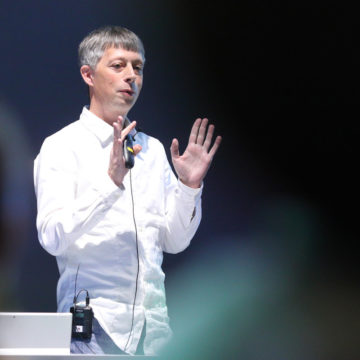
細胞生物学研究
Frank Uhlmann
特任教授
染色体動態 細胞周期 染色体分配 分子生物学
略歴
Frank Uhlmann was born and grew up in Germany. He studied biochemistry and physiological chemistry at the University of Tübingen before joining Jerry Hurwitz's laboratory at Memorial Sloan-Kettering Cancer Center in New York for his PhD studies. Frank then moved to the Institute of Molecular Pathology in Vienna, Austria, to work as a postdoc with Kim Nasmyth. In 2000, he established a research laboratory at the Imperial Cancer Research Fund in London. He has remained there ever since, while the institute became part of Cancer Research UK and now The Francis Crick Institute. His work on chromosome segregation was recognised with the EMBO Gold Medal in 2006, he was elected fellow of the Royal Society in 2015. Frank is affiliated with the Tokyo Institute of Technology as a visiting Professor since 2017.
WRHIへの期待
Progress in research is built on new ideas that we obtain from opening new horizons. The WRHI allows me to experience an additional world of excellent science, in addition to my usual surroundings in London. This is immensely enriching. In return, I hope that my own experience contributes to the breadth of knowledge at the WRHI at the Tokyo Institute of Technology.
研究プロジェクト
-
長年にわたり、Uhlmann研究室は、コヒーシン複合体が姉妹染色体接着の分子機構の解明について大きな貢献をしています。
| 2000 - 2004 |
Research Scientist, Imperial Cancer Research Fund |
|---|---|
| 2005 - 2014 |
Senior Group Leader, Cancer Research UK London Research Institute |
| 2015 - |
Senior Group Leader, The Francis Crick Institute |
| 2017 - |
Specially Appointed Professor, Tokyo Institute of Technology |
| 1997 |
Promotionspreis, Faculty of Chemistry and Pharmacology, University of Tübingen |
|---|---|
| 2002 |
EMBO Young Investigator |
| 2003 |
Balfour Lecturer of the Genetics Society |
| 2005 |
Hook Medal of the British Society for Cell Biology |
| 2006 |
EMBO Member EMBO Gold Medal |
| 2015 |
Fellow of the Royal Society |
| 2004 |
Lengronne, Y. Katou, S. Mori, S. Yokobayashi, G. P. Kelly, T. Itoh, Y. Watanabe, K. Shirahige and F. Uhlmann (2004) Cohesin relocation from sites of chromosomal loading to places of convergent transcription. Nature 430, 573-578 |
|---|---|
| 2005 |
T. Higuchi and F. Uhlmann (2005) Stabilisation of microtubule dynamics at anaphase onset promotes chromosome segregation. Nature 433, 171-176 |
| 2006 |
E. Queralt, C. Lehane, B. Novak and F. Uhlmann (2006) Net1 phosphorylation and mitotic exit initiated by separase-dependent down-regulation of PP2ACdc55 phosphatase. Cell 125, 719-732 |
| 2008 |
T. Rolef Ben-Shahar, S. Heeger, C. Lehane, P. East, H. Flynn, M. Skehel and F. Uhlmann(2008) Eco1-dependent cohesin acetylation during establishment of sister chromatid cohesion. Science 321, 563-566 |
| 2009 |
S. Lopez-Aviles, O. Kapuy, B. Novak and F. Uhlmann (2009) Irreversibility of mitotic exit is the consequence of systems level feedback. Nature 459, 592-595 |
| 2011 |
C. Bouchoux and F. Uhlmann (2011) A quantitative model for ordered Cdk substrate dephosphorylation during mitotic exit. Cell 147, 803-814 |
| 2014 |
Y. Murayama and F. Uhlmann (2014) Biochemical reconstitution of topological DNA binding by the cohesin ring. Nature 505, 367-371 |
| 2015 |
Y. Murayama and F. Uhlmann (2015) DNA entry into and exit out of the cohesin ring by an interlocking gate mechanism. Cell 163, 1628-1640 |
| 2018 |
Yasuto Murayama, Catarina P. Samora, Yumiko Kurokawa, Hiroshi Iwasaki, Frank Uhlmann(2018) Establishment of DNA-DNA interactions by the cohesin ring. Cell 172, 465-477 |
